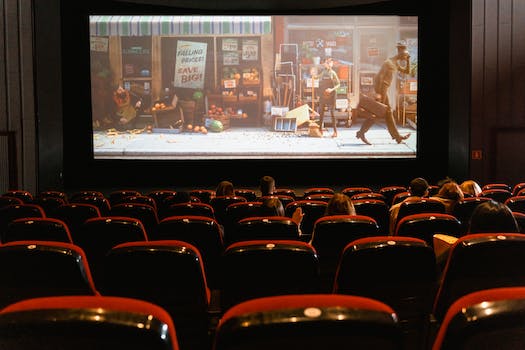Reviews of movies have always played an important role in the film industry. With a rising number of movies being released each year, audiences typically rely on reviews to evaluate which films are worth their time and money. However, the relevance of movie reviews has been a subject of controversy. Others contend that personal preference and word of mouth are far more influential than reviews in shaping an audience’s decisions. Do movie reviews really make a difference? that is the question we shall attempt to answer here.
- 1. Introduction
- 1.1. The significance of movie reviews
- 1.2. The influence of movie reviews on audience
- 1.3. The role of movie reviews in the film industry
- 1.4. The evolution of movie reviews
- 1.5. The purpose of this article
- 2. Pros of Movie Reviews
- 2.1. Helping viewers make informed decisions
- 2.2. Providing critical analysis and insights
- 2.3. Guiding audience to discover new movies
- 2.4. Promoting dialogue and discussion
- 2.5. Contributing to film appreciation
- 3. Cons of Movie Reviews
1. Introduction
Reviews of recent films have been widely distributed and read by audiences for many years. They serve as a platform for critics and audiences alike to voice their opinions on the current flicks. Are critical assessments of films even relevant? Both moviegoers and experts in the field have strong opinions on this matter. Reviewers’ opinions on a film’s success or failure are split, with some saying they have a major impact and others saying they don’t. In this piece, we’ll discuss whether or not you should use movie reviews as a guide when picking a film to see in theaters.
1.1. The significance of movie reviews
The importance of film critics cannot be overstated. As a result of their reviews, moviegoers are better able to make an educated selection about which movies to see. Reviews, both professional and audience, have a significant impact on how people feel about and talk about a movie. This article will discuss the value of film criticism and its impact on the cinema business in the modern day.
1.2. The influence of movie reviews on audience
Reviews of films have traditionally been influential in getting people to see those films. By reading these reviews, potential viewers can get a better idea of whether or not the film is worth their time and money. Movie reviews have always carried weight, but in today’s age of instantaneous communication, they carry much more clout. This section discusses the influence of movie reviews on the audience and how they can shape their movie-watching experiences.
1.3. The role of movie reviews in the film industry
Critical assessments of films are essential to the business. They help people decide what to watch at the theater by giving their expert analysis and commentary. The purpose of movie reviews is to provide a forum for the expression of both positive and negative opinions about a film. Reviews not only affect how people feel about a film, but also how well it does at the box office and in the conversation of cinema as a whole. Reviews are a vital tool for filmmakers in assessing how their films are being perceived by the general public. In sum, reviews play a crucial role in the film industry by informing consumers and adding to the continuous conversation about movies.
1.4. The evolution of movie reviews
There has been a dramatic shift in the distribution of movie reviews from print to online media. The proliferation of the internet and social media has transformed the way that movie reviews are disseminated and read. This essay will examine the contemporary significance of film criticism.
1.5. The purpose of this article
For a long time, viewers have relied on reviews to help them decide which films to see. Insights, thoughts, and critiques of the newest films are provided so that moviegoers can make educated selections. But in this day of instant online communication, the issue arises: are movie reviews even useful anymore? This piece intends to inquire into why movie reviews are written and if they serve any useful function.
2. Pros of Movie Reviews
There are several reasons why a review of a film can sway a potential viewer’s choice to see it. It’s important to have a critical appraisal of a film’s acting, direction, plot, and cinematography, and reviews do just that. In this way, potential viewers can acquire a feel for the film and choose whether or not it will suit their tastes. Movie critics provide moviegoers with a more well-rounded picture of a film by discussing both its merits and its flaws. In particular, this can be useful for people who wish to make an educated decision regarding the movies they see. Film criticism may also be a forum for exploring and debating the film’s multiple meanings and themes. They can enrich the movie-watching experience and create lively debates among movie buffs. Overall, movie reviews are a valuable resource for enriching the experience of going to the movies.
2.1. Helping viewers make informed decisions
Moviegoers can take advantage of a number of benefits thanks to reviews. Firstly, they present a critical appraisal of the movie, identifying its virtues and shortcomings. In this way, audiences can gauge whether or not the film’s quality meets their expectations. As an added bonus, moviegoers can get a sense of the film’s plot, characters, and themes from reading reviews. This is very useful when choosing from several similar movies or genres. Even more helpful is the fact that reviews frequently discuss technical factors like the film’s photography, sound design, and special effects. Last but not least, reviews can help people avoid wasting time and money on films that aren’t worth seeing. Moviegoers can find far more films that suit their interests and preferences by reading reviews beforehand.
2.2. Providing critical analysis and insights
Both spectators and filmmakers can benefit from the critical analysis and new perspectives offered by reviews. They are essential in directing moviegoers in the proper direction and assisting them in making educated choices. The benefits of film criticism include the following:
Movie reviews are useful for a number of reasons, the first being that they provide a wealth of information. They inform readers exactly what they’re getting into and whether or not a film is worth their time and money.
Second, they provide an assessment of the film’s constituent parts. An objective evaluation of a film’s merits and shortcomings is provided by critics who study its plot, characterization, and special effects.
Movie critics all have slightly varied opinions on a film, and reviewers’ differing viewpoints are reflected in the reviews. Some moviegoers have strong preferences for one type of story or style over another, while others are more open-minded. By reading a variety of opinions, moviegoers may determine if the film will satisfy their tastes.
Reviewers frequently discuss the film’s potential impact on society and culture. Thematic concerns, contemporary issues, and the film’s contribution to societal debates are all discussed. This dissection has the potential to illuminate complex issues and spark insightful debates among readers.
Movie critics provide filmmakers with valuable feedback in the form of reviews. Feedback like that is crucial in pointing out the film’s strengths as well as its flaws. Filmmakers can use this criticism to hone their skills and make better movies in the future.
Finally, it is clear that both moviegoers and filmmakers benefit much from having access to reviews. They aid in the overall appreciation and comprehension of cinema by providing critical analysis, insights, and alternative views.
2.3. Guiding audience to discover new movies
Reviews of films serve as an invaluable resource for helping the general public find new movies to see. Reviews are extremely helpful because of the information and insight they bring about a film. Before spending time and money on a movie, consumers can learn more about the film’s plot, characters, and quality by reading reviews.
The many points of view presented in movie reviews is one of its many benefits. It’s helpful for readers to be able to weigh the opinions of various critics and come to their own conclusions. Moviegoers can narrow down their options by reading reviews, which often highlight both the positive and negative aspects of a film.
Furthermore, movie reviews can serve as a source of enjoyment themselves. Reading a review that has been written well can be entertaining since it gives the reader insight into the film industry and piques their interest. They can also be used to spark debate and conversation among movie buffs.
Reviews are important because they help people find new and interesting movies to watch. They offer vital ideas, various viewpoints, and may be an interesting read in their own right.
2.4. Promoting dialogue and discussion
When it comes to fostering conversation and debate among film buffs, movie reviews play a key role. Movie critics serve as conversation starters by offering up their thoughts and observations on the films they see. Conversations like these enrich the experience of watching a film and teach viewers more about the cinematic medium as a whole.
Reviews of movies are helpful because they point potential viewers in the right direction. To determine whether or not to see a film, many individuals read critics’ opinions. The plot, acting, and general quality of a film can all be better understood by reading a review. With this knowledge at their disposal, they may pick movies that truly speak to them.
Plus, reviewers have a forum in which to dissect and discuss the film in question in reviews. These reviews serve two purposes: they inform audiences about the film’s merits and flaws and give directors constructive criticism. Filmmakers, actors, and others in the business can all benefit from constructive criticism in order to hone their skills and deliver more satisfying viewing experiences for moviegoers.
In addition, critical assessments of films add to the ongoing cultural dialogue around them. They provide insight into fundamental cinematic ideas, messages, and societal concerns. Reviewers can inspire viewers to think deeply and critically by touching on these issues. This helps folks to broaden their cinematic horizons and gain a richer understanding of the art form.
In conclusion, reviews are crucial because they spark discussion, direct audiences, offer critical feedback, and add to the ongoing conversation about films in popular culture. They play a crucial role in enhancing the movie-watching experience and promoting a greater understanding and respect for the art of film.
2.5. Contributing to film appreciation
Critical analysis of films is an essential part of understanding and enjoying them. They provide an in-depth examination of the film’s many facets that helps one better understand and appreciate the craft of filmmaking. Reviews of movies are useful because they provide potential viewers an idea of the film’s quality in terms of story, acting, and production.
In addition, critics can use reviews to voice their thoughts and feelings about a film. These critiques have the potential to stimulate debate and encourage audience members to offer their own thoughts and opinions on the film. Reading reviews written by a variety of critics gives moviegoers access to new perspectives and interpretations, enriching their experience of the film as a whole.
Filmmakers and other professionals in the industry might also benefit from reading reviews. Artists can learn from reviews and develop as people and creators by taking in the constructive criticism offered there. It’s an effective form of criticism that pushes filmmakers to improve their craft and explore new avenues of expression.
In conclusion, critical analysis of films is impossible without them. They help audiences make better decisions, spark debate, and provide directors constructive criticism. Reviews, both positive and bad, help the public appreciate and comprehend the cinematic medium.
3. Cons of Movie Reviews
There are benefits to reading movie reviews, but it’s not a good idea to base your viewing decisions on them alone. The first is that everyone has different tastes, therefore a reviewer’s criticism of a film may be an aspect that you like. As a result, listeners may receive contradicting information. The viewing experience can be diminished since movie reviews frequently reveal important story details or twists. Some people prefer to go into a movie with no prior knowledge or expectations, and reading reviews might damage the element of surprise. Furthermore, reading too many reviews can prevent you from seeing new forms of filmmaking. If someone just watches movies based on positive reviews, they may miss out on hidden gems or experimental films that may not have earned critical praise. While reading reviews can help you narrow down your options, it’s ultimately up to your own preferences and enjoyment level to determine which films you want to see.
3.1. Spoiling the movie experience
The major problem with movie reviews is that they often ruin the film for the audience. Reading a review of a film can ruin the experience for the viewer by giving away major narrative details, twists, and even the finale. That can ruin the fun of discovering the movie’s twists and turns on your own. Further, some reviewers may incorporate subjective views that color the reader’s expectations before they’ve even seen the film. Because of this, the spectator may be less likely to make their own honest impression of the film. As a result, reading reviews might ruin the surprise of seeing a film for the first time.
3.2. Creating biased opinions
It is a prevalent worry that movie reviews may create skewed perspectives. Reviews can be informative, but they also have the potential to be biased and skewed by the reviewer’s tastes or ulterior motives. This prejudice can lead to false claims being made about movies and the information they contain. Movie review readers would do well to keep this prejudice in mind and read with a critical eye. The merits and cons of a movie can be better understood by taking into account a variety of reviews and perspectives.
3.3. Influencing box office success
While movie reviews can have a substantial impact on box office performance, there are also some drawbacks linked with them. One big drawback of movie reviews is that they are often subjective and influenced by the reviewer’s own tastes. This means that an unfavorable review from a well-known reviewer can turn off potential viewers who otherwise might have appreciated the film. Movie reviews can also ruin the experience for others who haven’t seen the film yet since they give away key story points or reveal spoilers. Furthermore, the effect of movie reviews can lead to a herd mentality, when people rely completely on the opinions of others without formulating their own judgments. This can limit moviegoers’ exposure to different styles and genres by discouraging them from watching a wide variety of films. The overall impact that movie reviews have on a film’s success at the box office should be considered with caution, despite the fact that they can be informative and beneficial.
3.4. Ignoring personal taste and preferences
Aside from the fact that everyone has different tastes, there are a few drawbacks to relying on critical assessments of films. To begin, it’s important to keep in mind that evaluations of films are inherently biased because they reflect the reviewer’s personal tastes and ideas. What one viewer finds to be the film’s flaws, another may find to be its greatest strengths. Reviews should be taken with a grain of salt, and you shouldn’t base your viewing decisions exclusively on them.
Second, there are a number of elements that can impact or even cause prejudice in movie reviews. It is possible for reviewers to be influenced by their own preferences, biases, or even conflicts of interest. This can cause a reviewer to get an incorrect or misleading opinion about the film.
Furthermore, movie reviews frequently reveal crucial narrative details or provide spoilers, which can ruin the experience for individuals who like to walk into a film completely blind. If you read a review that gives away major plot points, you might as well have not seen the movie at all.
Finally, it’s important to keep in mind that movie reviews are the opinion of a single person and may not reflect the tastes of the wider public. A critic’s tastes and expectations for a film may differ from those of the typical audience. For this reason, it’s not wise to make a judgment on a film based on a small number of reviews alone.
3.5. Restricting creativity and diversity
Suppressing originality and variety:
Conclusion
In conclusion, movie reviews are important because they allow audiences to make more educated viewing choices. The critical reception of a film is also crucial to its overall success.




